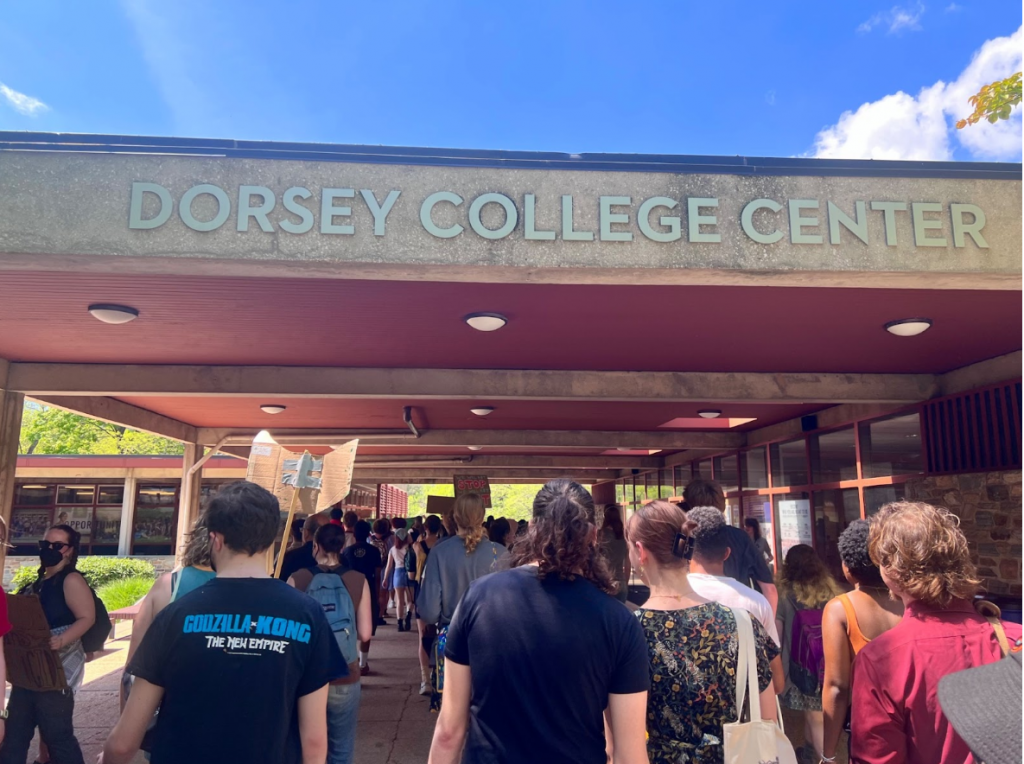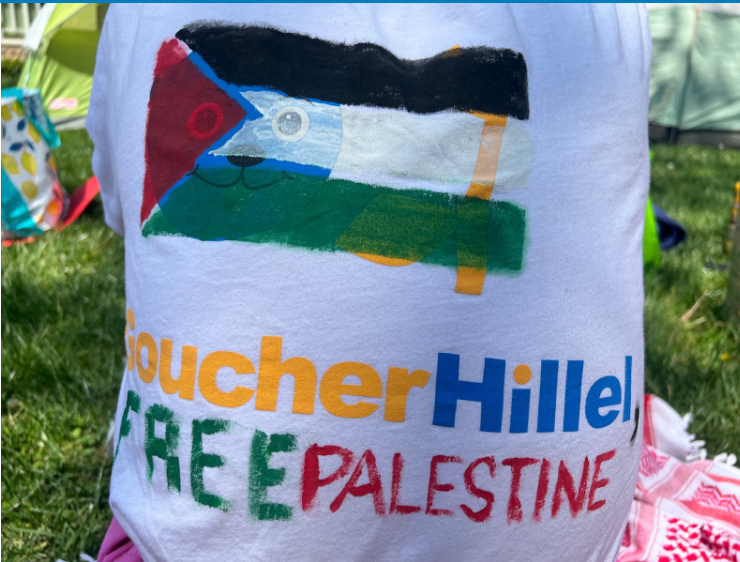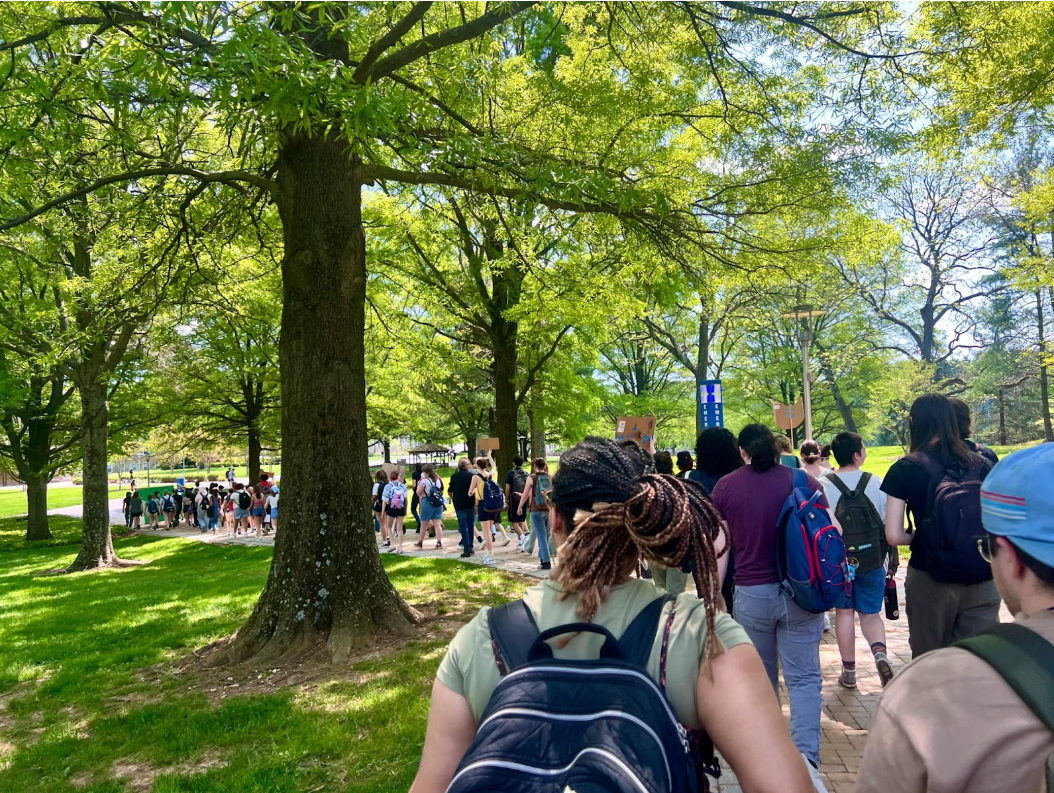By Olivia Barnes and Sam Rose
Students skipped class to perform a sit-in on April 29th demanding administrative action concerning Goucher College’s response to the Israel-Hamas war. One week after tents were pitched on Goucher’s Great Lawn, Leaders from Students for Free Palestine, a student advocacy group moved their encampment to the academic quad between Hoffberger and Julia Rogers. The student protestors camped out in solidarity with Gaza following the example of other American colleges such as Columbia and Yale. Sunday morning, organizers handed out physical copies of their mission statement and list of demands for the administration in front of the Atheneum, detailing the protest that followed on Monday.




Organizers and de-escalators leading the walkout did not wish to be identified by name by The Quindecim.
“The point is not to do class as usual,” said one of the leaders over a megaphone. The walkout began at noon, with students gathering on the green between the academic buildings. The turnout was significant, with at least ten professors present, and approximately forty students, not including the around twenty organizers already stationed at the encampment. More students came and went as the demonstration progressed.
One Goucher professor, who chose to remain anonymous for privacy, explained why they showed up, saying, “I’m troubled by Goucher’s censorship of students, and the way student protests–nonviolent, peaceful, protests–are being shut down.” A handful of professors reportedly canceled or delayed class so they and their students could attend the walkout.
Emily Roat, 2024, explained her presence at the walkout saying, “Because my college is complicit in genocide, and I don’t want to be complicit in genocide.”
The organizers started by first acknowledging who were the de-escalators (referred to as “marshals”) among them, and letting students know that there was water and face masks available. A speaker read off the aforementioned list of demands from students(transcribed below) and were met with cheers and noises of approval. Notably, the list was not created by any one group or person, but built from feedback and guidance from students and their peers. There was a QR code being distributed that linked to a questionnaire asking students whether they agreed with the demands, and if not, what they would like to see amended. “Our tuition dollars could be funding genocide, weapons manufacturing, Israeli apartheid,” prefaced one organizer.
Leaders from Students for Free Palestine expressed demands that they wanted Goucher Administration to meet; Especially a formal acknowledgment of the conflict in Israel as a genocide, for Goucher Study abroad to not list Israel as an approved destination, and for disclosure of Goucher’s financial investments and divestment from enterprises contributing financially or materially to the conflict in Israel. There were also demands for institutional protections for student protestors, with a more liberal protest policy and discontinuation of the poster approval process that began enforcement within the past year.
| We demand that Goucher College: Acknowledge the ongoing genocide against Palestinians in the form of a written statement. Provide full transparency regarding the nature of the college’s investments. At minimum, make publicly accessible an annual report on the college’s endowment investment portfolios in addition to the college’s financial statements. Support the academic boycott of Israel by removing Israel’s study abroad programs from the college’s approved program list. Immediately suspend the current demonstration policy and allow students to speak and protest freely and without restrictions. Written or visual expressions of speech in support of or in solidarity with Palestine must be tolerated without censorship by the college, unless such speech expresses hatred for an individual or group of people, constitutes a threat, or incites violence. To protect this right, we demand an end to the flier approval process. Should any future demonstration policies be adopted, the college must include a detailed grievance and retaliation-protection procedure for students; and include accountability mechanisms regarding the procedural and schedule requirements for the college to grant or withhold permissions on both a standard and expedited timeline. Future adoption of a demonstration policy must receive student input through student town halls and receive a majority vote of approval from the college’s faculty prior to its adoption. Continue to work with faculty to develop an institutional definition of antisemitism that does not equate with, nor is determined by, anti-Zionism. Support students of all faiths and beliefs, in equal measure, and establish a grievance procedure for students who are not provided with religious accommodations. This must include, but is not limited to, providing an alternative space for anti-Zionist Jewish students who do not feel represented by Hillel. Immediately cease the discriminatory and excessive surveillance of students and activists. This includes, but is not limited to, the profiling and selective enforcement of campus policies against students, alumni, faculty, and staff forheir engagement in pro-Palestinian activism and advocacy. In particular, the college must immediately end the profiling, policing, and punishment of Muslim, Arab, Black, and Brown students, student activists, and community members. The administration and the public safety department must consider the repercussions and impact of threatening students of color with police terror, issue a public statement acknowledging the harm sustained by the community from this practice, and outline a plan to protect vulnerable students from discriminatory and excessive surveillance in the future. This demand necessitates the revision of Goucher’s Code of Conduct to prohibit the “doxing” of individuals and organizations for their activism. |
The list of demands from Students for Free Palestine.
In the midst of the demands being read, one voice from the back of the crowd shouted, “release the hostages!” to which an organizer responded, “Sir, if you have an opinion, you can create your own event.” The individual was identified as visiting assistant professor Ohad Paris of the Environmental Studies department, who was taken aside by some of the appointed de-escalators as the event continued. Paris alleges he was told he was making students feel unsafe
Paris agreed to an interview following his appearance at the demonstration. Paris himself was raised in Israel. Surrounding the general sentiment at the gathering, Professor Paris clarified his viewpoint, saying, “I saw all this standing united for the Palestinian cause, then against Israel, then for ending the war, all these demands. Some of them I agree with completely, ending the violence, others just seem to be distortions. And no mentions of the hostages. When the person said, ‘we’re going to go march now,’ and said that we were going to practice the chants, I chanted first.”
Goucher students, holding signs and banners, left the academic quad and led chants as they made their way down Van Meter Highway and to the Dorsey College Center. “Money for jobs and education, not for war and occupation,” and “Free, free Palestine.”
Upon reaching Dorsey, the students continued to chant, and circled the interior pathway before settling inside. They stopped outside Admissions and the Office of the Registrar. The recurring chant towards faculty and administration was, “Disclose, divest, we will not stop, we will not rest!” Around 12:32pm, the group attempted to enter the indoor area of the College Center, but was initially denied. After pushing as far into the entrance as they were permitted, the faculty blocking the doorways eventually gave way. An open mic began at 12:45pm, providing a forum for anyone there to speak their mind. Enough students were packed into the lobby that many had to wait outside in order to provide a path to the door.


A self-identified Jewish student, who elected to remain anonymous for personal safety addressed the students sitting in “I appreciated the demands for providing a space for students who don’t feel represented by Hillel.” As for leading the crowd into Dorsey, “I feel like the execution of the protest went a little far, like going inside. But the idea is creating disruption, so I get it.”
There was a predominant dialogue surrounding the experiences of Jewish students, and the narrative surrounding Israel and Palestine as it relates to faith and ethnicity. “Do not allow them to convince you that there was no peace between Christians, Muslims, and Jews before the creation of Israel,” said one student, taking the megaphone for the open mic. This was met with snaps and applause.
“I’m a Jewish student at Goucher, and I don’t feel like my voice is valued or empowered,” said another. “When all this started, Hamas made an attack. President Kent Devereaux was very quick in condemning that violence. Okay, cool, condemn it when it arises. But when people in Gaza die, they do not say anything. They do not value the life of a Palestinian.” They continued, “Really, with what Judaism is, there’s an intentional conflation with Zionism–settler colonialism. I feel safer here [than Hillel] because no one here has that conflation.” Professor Zahi Khamis of the Arabic Studies department sat among protestors. “I must admit, before coming to Goucher, I had worries about learning from a Palestinian professor. But no other professor has instilled so much pride in Judaism in me as Zahi has.”

Some students brought drums, some used the trash receptacles, and tambourines could be heard in the lobby. There was stomping, chanting.
When asked why she was at the demonstration, SGA president Emma Kistner, 2025, said, “I thought it was important that I showed my support for a demonstration that I believe in, and a movement I personally support.”
A student, 2025, who elected to remain anonymous for safety reasons, explained why they attended the protest. “I was there when they took down the first set of posters that were pro-Palestinian, under a guise of a new campus demonstration policy. I was also there when Jasmine Lee decided to defend the policy by explaining that it was created the summer prior, rather than listening to the voices of students who believed that the policy was being specifically and tactically weaponized to be used as a form of suppression.”
They continued, “ I’m here because I do not believe that the Middle Eastern alum who was banned on campus for pro-Palestinian efforts that were not anti-Semetic, but rather anti-genocide deserved to be banned.” They concluded, “I’m here today because I believe that there is a collective consciousness and a collective effort that is needed to wake everybody up.”
The next morning, April 30th at 11:21am, an email from President Devereaux went out to students, faculty, and staff, with the subject line, “When Campus Demonstrations Cross the Line.” The email condemned protestors for having “verbally attacked or threatened staff members leaving Dorsey Center, pounded on windows, kicked walls, and shoved their way through doors or past campus safety personnel.”

The President clarified that approved protests were acceptable. “Anyone at Goucher is always welcome to freely express themselves through sanctioned protests or demonstrations.” The email gave the students in the encampment an ultimatum, requesting that they were to remove the tents and “abide by the campus demonstration policy.” Surrounding consequences, President Devereaux went on to say they “could range anywhere from losing the ability to reside on campus, loss of scholarship support, or possible suspension or termination from Goucher College.”
The President assured the student body that anti-Semetism and anti-Arab sentiment is not tolerated at Goucher, and condemned the “atrocities and lives lost in both Israel and Palestine.” Responding to the calls for Goucher to take an official stance on the conflict, Devereaux said, “As a president of a liberal arts college, I remain committed to leading an academic institution where all views can be freely expressed without fear for one’s safety.”
Towards the end of the address, President Devereaux also mentioned how he has “complete confidence that our students will remove the tents from the Academic Quad and find alternate ways to engage in productive conversations with me and others at Goucher,” he wrote. “Failure to do so could result in the potential cancellation of our closing gala, Convocation, affinity ceremonies, and Commencement.”
As of the time of publication, the encampment still stands.


Thank you for the rapid turnaround with this coverage! But I think we should be talking more about the fact that our president blatantly lied about and misconstrued the events of yesterday’s protest. The staff present at Dorsey were in no way harassed or prevented from leaving the building, and despite the implication that the protest had ties to antisemitism, that could not be farther from the truth. The mission statement of Students for Free Palestine as quoted in this article makes that clear. Also, making a lot of noise is common practice at a protest, so why that was a problem is beyond me.
In addition, Goucher has been leasing the Kraushaar Auditorium to a “church” (cult of bigots) which conducts antisemitic sermons for months now, so any investment they claim to have in combatting hate against their students is completely nullified by the fact that they let purveyors of hate into our spaces.
[…] Participants are not required to obtain permits from the university for demonstrations on that field, according to Towson’s time, place and manner policy. Before disbanding, the demonstrators invited spectators to join them Thursday at Goucher’s encampment, which has been going since April 29, its student newspaper The Quindecim reported. […]
[…] characterization was disputed by students, faculty and student newspaper coverage, which described the sit-in much more […]
[…] experienced unrest last spring, when pro-Palestinian encampments broke out at Johns Hopkins and Goucher College. Protests also rocked campuses around the state, like the University of Maryland, College […]